| Reports of visits to Japan of POWs |
Friendship meeting with Japanese citizens
in Tokyo on October 4, 2012
| Mr. Colin Neil Begley | Ms. Susan Allard | Ms. Valerie Jean Hamley |
| Mrs. June Patricia Martin | Mrs. Belinda April Begley |
Mr. William H. Shumitt |
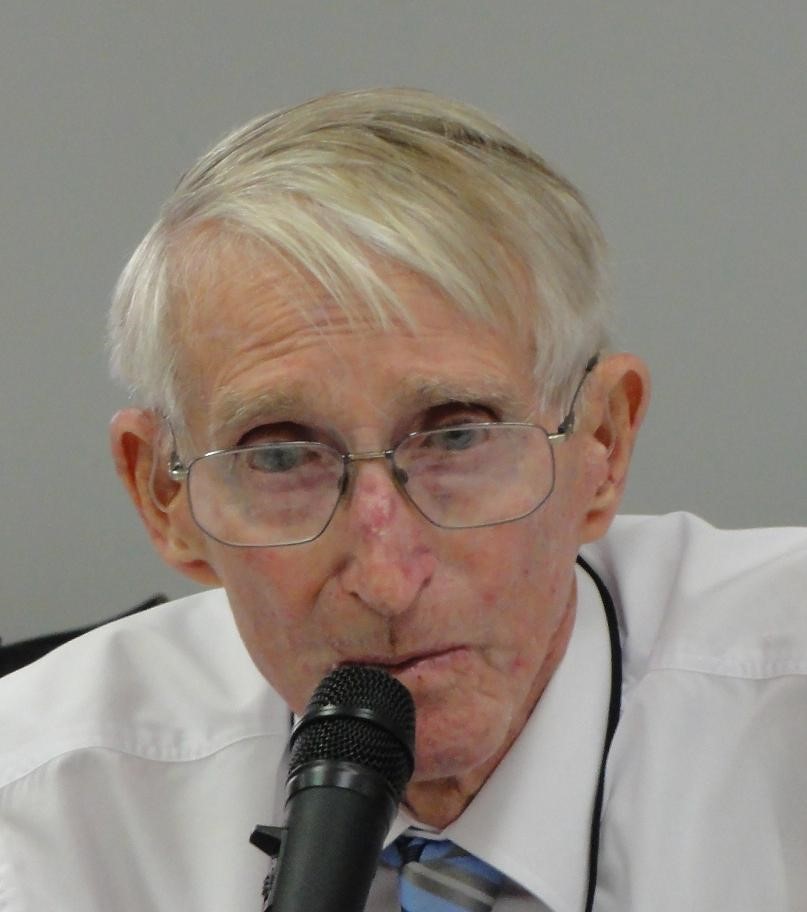 |
Thank you very much. Thank you for the introduction. I am Australian, so I guess I had better speak slowly and let the interpreter pass on what I am saying to you. I guess a lot of you know or speak English. Firstly, I want to congratulate...
I'd like to commend the Japanese Society for Friendship with ex-POWs and Families. This is something I've never heard of until about three months ago when I was invited by your government to come to Japan.
Perhaps I should begin by telling you my story of my army life. I joined the Australian army in 1940, in the early 1940. And, after training, I was transported to the Middle East where we were fighting and [with] the Germans at Vichy French.
In January(correctly December)1941, when Japan declared war, we were, I was on the ship along with Mr Hamley here, coming back from the Middle East and we thought we were going to Australia unfortunately; we were diverted to Java and captured by the Japanese army on the island of Java. I was captured on the 9th of March and we were not part of the 8th Division in Singapore. We were captured in smaller groups scatted over the island and in different camps and I eventually after about a year in Java was transported on my way to Thailand.
Unfortunately while in transit at Singapore, many came down with dysentery which is a very fatal disease, something like cholera and the group that I was traveling with went on Thailand and I remained in Singapore.
We were worked every day on building an airport in Singapore and at that early stage I was in Changi camp that in the ... of that year I was transported and moved in to the Changi prison where I spent the rest of our POW days. The tragedy of all of this was of course was the death rate of the prisoners of war due to malnutrition and medication caused a tremendous amount of death out of the 21 odd- thousand that were captured, 8 thousand died in POW camps. We were made to work of course in pretty harsh conditions.
When I look back on it, I realized that as the war progressed and Japan lost the control of the sea, it became impossible for them to get rice into Singapore, and not only were we starving in the jail but also the local population and I guess the troops, the Japanese troops, weren't able to feed either.
I was [down with] malaria during the imprisonment days, plus I wouldn't know how many times [I had] dysentery and other diseases, but luckily I survived, and now I look back of it, I have never ever had any bad feeling towards the Japanese. I can never forget what happened to me. I mean, is it possible to forget prisoner of war days, but so far as holding a grudge against the Japanese, I long, long ago forgot about it and put all the bad things behind me and I realized it's helpless, it's useless, trying to keep on hating people because it doesn't do you any good.
When I got out of the Army and went back to work, I put all the POW days behind me. I think there is no purpose in looking behind you. I mean, life is about looking ahead. You people have different culture than ours. Slowly, but surely we are learning about each other's culture. In Australia people complain and lots of people complain that the Japanese should be taught at school for what happened in war years, but while that is all very well to say, there is nothing done in Australia to teach the Australian children about the war either, and so you know, it's pointless about pointing the finger at someone and saying, "teach about the war". Our own children weren't taught about it. But looking back I feel that it was a waste of time in any case.
...visit... today. We arrived here on Monday and we have been greeted and looked after and attended to. The attendance has been remarkable – very, very good, you are very hospitable, kind and we are amazed or I have, my first time to be in Tokyo, to see such a great big city, so clean, and your culture and your manners. Leave nothing to be desired. And I thank you very, very much indeed. I hope to we have a chance talk together afterwards. Thank you.
Mr. Colin Hamley |
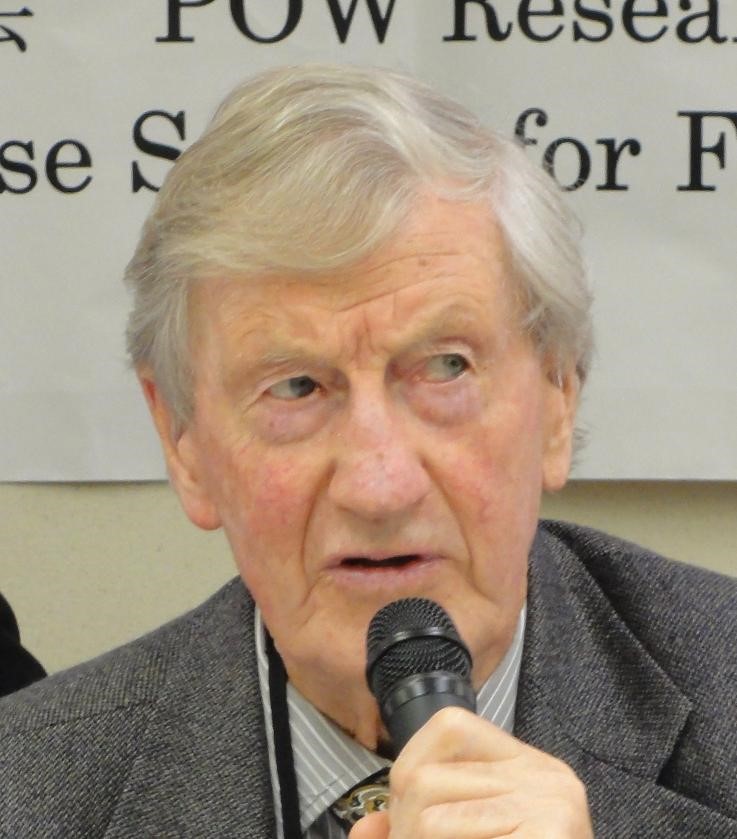 |
Well, thank you for your welcome, and I am very pleased to be here this afternoon to tell my story. Unlike Bill, my friend, I felt very, very bitter about what happened to us as prisoners of war, and I'm going to tell you rather sadder stories perhaps than what Bill had.
I became a prisoner of the Imperial Japanese Army in March 1942, along with some 3500 Australian other servicemen, that would have landed on Java to support the Dutch to resist the Japanese invasion. It was the beginning of an ordeal - of utter humiliation, maltreatment, enslavement, starvation rations, and the denial of medical care. Conditions steadily became worse as the years dragged on.
We were shipped to Singapore in October that year, 1942, and packed into the hold of a freight ship in extremely cramped conditions and provided with little or very little food or water. The heat in the hold was intense many prisoners suffered from dysentery, which was a great discomfort for all.
After the six day journey we arrived in Singapore in very poor conditions with men being sent directly to the hospital for treatment. One man, only man perhaps, died on the way. We left again in February 1943. This time to Burma and we were put to work as slave labourer building the infamous railway, 415 kilometers long from ... in Thailand.
This was a desperate venture, which cost so very many thousands of lives of POWs and enslaved civilian conscripts. In June 1943 I was advised that my older brother Don, who was also working on the Burma-Thai railway died in another camp about 60 kilometers away from me. He died two days after his 22nd birthday of malnutrition, malaria and dysentery, and this was terrible news for me to receive, and there was no chance given for me to attend his burial.
The work on the railroad became to drop in conditions. With the onset of wet [season] torrential rain fell almost continuously for the next six months.
The ...roads became almost impassable and the food supplies were never anywhere near adequate. ...and diseases, like malaria, dysentery, cholera, pelagra, beriberi, and the shockingly painful tropical ulcers became to flourish. Work under these conditions so many men having to work barefoot, boots having rotted away, and the clothes in rags. Perhaps the only thing we were wearing were flapflaps, or fundoshi.
Many men lost their legs from tropical ulcers, amputations were carried out without the benefit of proper anesthetics, and the sanitary condition was appalling. Medical supplies were minimal or nonexistent most of the time and we often had to pay Japanese soldiers to get them anyway. A number of men fit for work began to fall away and sick men were forced out to work and the death rate started to rise dramatically.
There is no justification for the brutality we suffered at the hands of Imperial Japanese Army, for poor rations, for being denied proper medicines, for critically ill men being forced out to work on working parties. We were all relatively young men and if given reasonable care might, however unwillingly, had been far more useful as a workforce if we were treated better. Instead, lots of many, many thousands of people were unfairly thrown away, as if counting for nothing.
A loss of my brother on the railway has always, until this day strongly influenced my views of the Imperial Japanese Army, of its brutality, its cruelty, and lack of sheer common humanity. In addition to that my mother who had lost two sons who were reported missing believed prisoners never received any confirmation of imprisonment from the Japanese authorities. Her death I believe was brought on by grief of not knowing where we were or whether [or not] we were alive.
However, it is now over 70 years since we became prisoners and at least two generations on. And ... you people have a remarkably different culture and I found it. I thank your government for the generosity shown in making this visit possible. And I hope to leave your county on much better turns than when I arrived. And I applaud your country on having committed itself to peace. You know of the 900 Australian soldiers that landed in Java in my battalion there are only 15 left. And of course they are well over 90 years of age.
I thank you for allowing me to tell you my story. Thank you very much.
Mrs. Elsa Francis Hatfield |
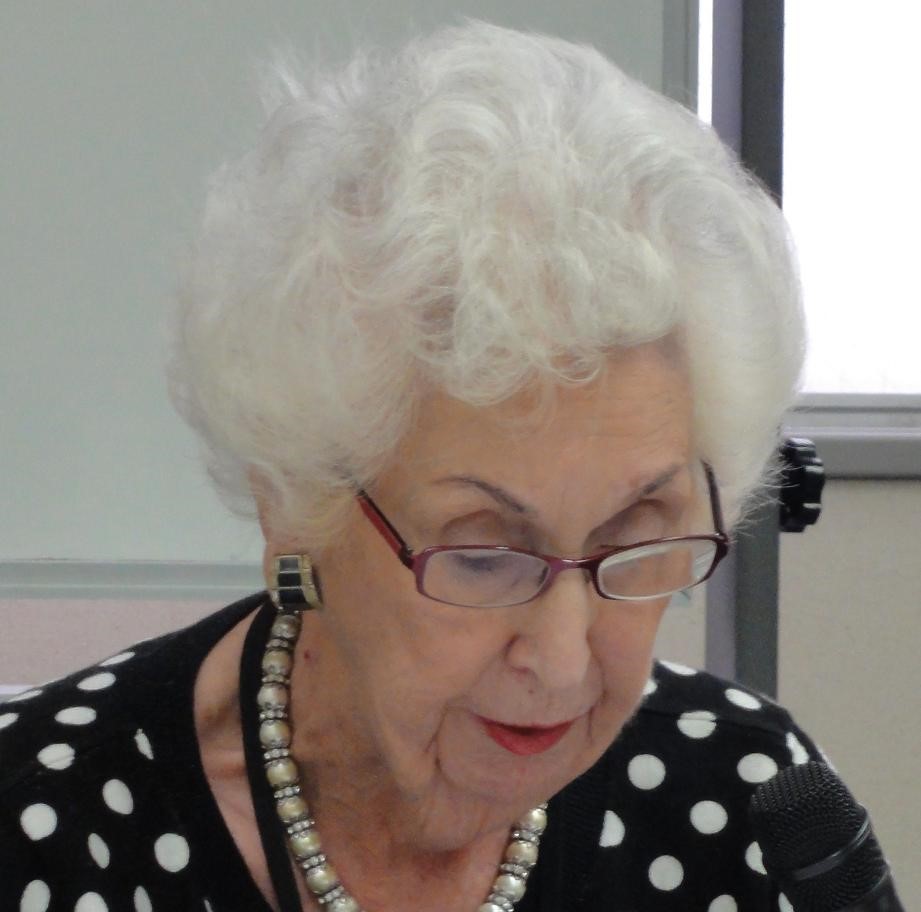 |
Good afternoon, I was born in Shanghai, China, and spent most of my childhood there. Life would be good for Europeans until the Japanese invasion of China in 1937. Shanghai was bombed by Japanese aircraft. By late 1941, the British consulate was urging all British people to leave.
My mother and younger sister stayed, but I was evacuated on the S.S. Anway (?) carrying 420 people. The ship left Shanghai in the early December 1941, on the 8th of December 1941 when we were one day out of Hong Kong the Japanese invaded Malaya. They had bombed Pearl Harbor the previous day. Our ship was redirected to Manila in the Philippines, anchored and was attacked by Japanese aircraft. Once it could dock we disembarked with only an overnight bag unknown to us the ship then sailed to Australia leaving us stranded in Manila. After three weeks of daily bombing, we woke to find that the US army had silently left.
Two days later I was taken from the guesthouse to St. Thomas University to join some 4000 others held there. At that time I was an 18-year-old teenager, not a worldly person and I was fearful for what was going to happen.
We had to sleep on top of large desks, 30-35 women crowded in each classroom. Men and women were segregated. We had two meals a day, a bowl of mush for breakfast with weevils and coconut milk, and something like stew for evening. In the years ahead as conditions slowly worsened we would look back with nostalgia on such meals.
After a year at St. Thomas, I was moved with others to an agricultural university in Los Banos. We were fenced in the open fields of the university, and 30 or more poorly constructed bamboo barracks with dirt floors. Each barrack held 100 internees, curfew was 6 pm, and we had no lights, except in the toilet blocks. The physical condition of us all visibly deteriorated.
Many of us suffered beriberi, dysentery, scabies, and leg ulcers. No medication was available to treat us and at times we had to stand for hours. By 1943, deaths averaged one day one a day, by 1945 the death rate doubled. Men who escaped the camp in search for food were caught and summarily shot. Food and survival became the total consuming preoccupation for us all. I felt very bitter towards the Japanese not only had they taken away our freedom, but their plan to starve us all to death was succeeding.
On the morning of 23rd February 1945 we were lining up outside our barracks for the 6 am Tenko roll call when the sound of planes from 9 USA air force Dakotas could be heard. And 130 paratroopers appeared firing their weapons as they descended. We dived under our beds or into trenches. Then a large force of amphibious Amtrak carriers, which has crossed the Laguna de Bay smashed through the camp fences. And hordes of Philippines guerrilla rushed the camp. After several minutes of shooting, most of the Japanese guards had been killed or escaped.
The raid by the troops of the US 82nd airborne division, US ... Battalion, and local guerrillas led by US and Philippines officers rescued 2107 civilians and internees. The commander Konichi was not in the camp on the day of liberation. In response terrible vengeance was wreaked on him and his forces on local inhabitants.
All our liberation on 23rd February 1945 I proceeded to Australia and became aware of a British force, joined and set forth to India in September 1945. We worked in teams of four, driving a large canteen and serving tea and sandwiches to the troops.
Then came the opportunity to go to Japan, as a member of WASB – Women's Auxiliary Service Burma - contingent attached to the British and Indian division of BCOF --- British Commonwealth Occupation Force. In Japan I was posted to the Queen`s Own Cameron Highlanders regiment in Kochi. >> Wikipedia
There I met my future husband who was a serving officer with the regiment. While I was living in Japan I had the opportunity to go to Hiroshima and saw the awful impact of the atomic bomb and realized you the Japanese people had also suffered. After my marriage we lived in a Japanese house in Kure and I was so happy. We met kind Japanese, and made good friends. Life was very good and to add to my joy I became pregnant and was looking forward to becoming a mother. I had a natural child birth, but sadly for my husband and I our little baby boy only lived for ten hours and he would be our only son. He is buried in Yokohama and I'm grateful to the Japanese government for giving me this wonderful opportunity to visit my son's grave for the very first time, and to refresh happy memories of time spent in the beautiful county of all those years ago. Had I not been sent to Japan, then I might never have met my wonderful husband to whom I've been married for over sixty-four years.
It was all such a long, long time ago. I have no regrets and now that I am an old woman. I have no animosity towards the Japanese people. I wish your county peace and every happiness in the future. And I might like to add at this stage, the wonderful wonderful city Tokyo and Yokohama that you have built, it's something that we could learn from you. My very best to you all.
Mr. Colin Neil Begley |
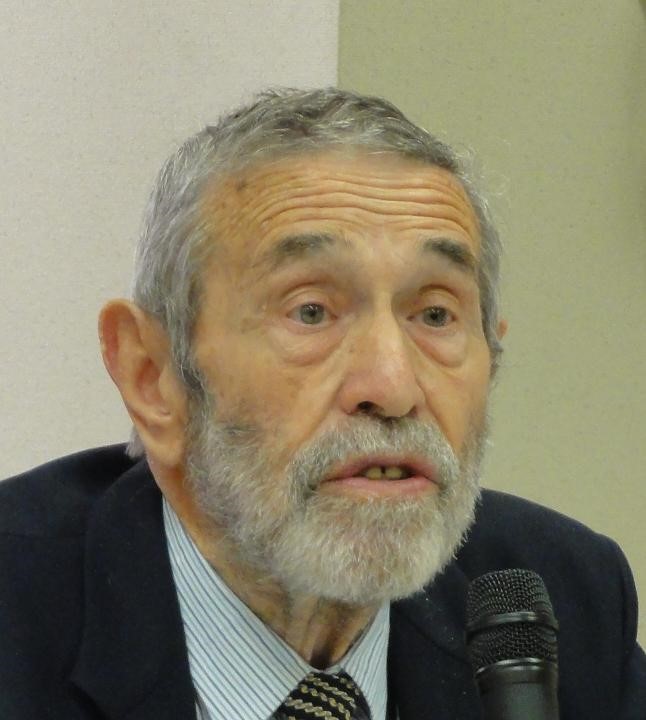 |
Inevitably, my story will have to be quite different from the ones you have heard from my colleagues because on the fateful day of the 8th of December 1941, it was the 7th of December on the other side when Pearl Harbor was attacked, but on that day, it was a Monday in North China I was in Tiehtsin. Excuse me if I use the English name of these cities because I was brought up with English names.
I was attending Tiehtsin grammar school. I was nine years old, my parents were living in Hong Kong at that time and my older sister my brother and I were at school, at a boarding school. That morning on the way to school there was a Japanese soldier standing on guard outside the school and he wouldn't let me in. Of course I didn't know it but World War Two or the pacific section of World War Two had started and I was indirectly involved. The Japanese army decided that they wanted to take over the school as a Japanese barracks so they told us we all had to go home.
Unfortunately for my sister, my brother and I, my parents were in Hong Kong and it would be absolutely impossible for us go down to where they were in Hong Kong. Fortunately, friends of ours in Peking agreed to take us in so the Japanese shipped us or I should say took us to Tiehtsin on what would be a freight train and then we moved to Peking where we were kept house arrest. I won`t go into any of the details on what the house arrest involved sufficient to say that the Red Cross heard about us. Do you have the Red Cross in Japan by the way? Do you know what Red Cross is?
So the Red Cross made representations to the Japanese authorities to have my parents released from Stanley prison in Hong Kong where they were being kept and for them to be brought to Shanghai. At the same time they made representations through the Red Cross for a Swiss national person, to accompany my sister, my brother and I, from Peking down to Shanghai to be united with our parents.
There was some pretty interesting that is the politest way to put it, experiences on that trip but sufficient to say we got to Shanghai and we reunited with my parents just before Christmas at the end of 1942.
I suppose I should have mentioned that our parents thought we were dead because they had sent us a telegram telling us to catch a particular ship that was going to go from Tiehtsin down to Hong Kong, then they were going to send us to Australia, but the ship was bombed and sunk with no survivors, and of course they thought we were on it but we didn't get the telegram.
By this stage all of the internment camps in Shanghai were full so we were then sent from Shanghai to Yangzhou, that meant we were put on the ship at Shanghai at the bund, taken down the ... river and then up to Yangtze river. We were then transferred off the ship onto barges, then taken up the Grand Canal to the city of Yangzhou.
There were 650 of us in the camp at Yangzhou, four families sharing a room, it was five meters by five meters, that's not very big and sixteen of us had to sleep in that room. I won't go into too much into the details of the camp.
The incredible thing was that approximately every three months we had a change of guards in the camp. Some of these guards treated us very, very badly, but some of them were very, very nice kind people. So when we had a bad bunch of guards, we hoped for a change of guards, when we had a good bunch we didn't want to them to change, thanks very much. We had to parade before the Japanese every morning, but it just depended on what time the Japanese came along or when the guards came along to inspect us sometime on hot days when it was more than forty degrees, we might be standing from six o'clock in the morning through to mid-afternoon before they arrived, or if it was snowing and there was two or three meters or so of snow on the ground, we might be left standing there for hours.
Our rations were very limited. We got a cupful of rice per person per day, one small turnip and boiled chrysanthemum leaves. We had no running water. We were rationed to one half bucket of water per person which you couldn't drink that because that was just for washing and you got about the same amount of water per person per day to drink.
We had no medication in the camp. I got malaria very, very badly. I used to go down with malaria, every second Friday afternoon, about between two o'clock and a quarter past two. You could set your watch by it. Malaria carried on for about ten years after the war was over.
But then one day the war came to an end, but nobody told us. There was a soldier walking along the wall of the camp where we were in was right in the corner of Yangzhou city and there was a soldier walking along the city wall and he called down to us, it was a Chinese soldier said "What are you doing down there?" And we children said, "We are prisoners." But he said the war had been over for two weeks. We said "Nobody told us." So he had a newspaper which he rolled up with a stone and he threw it over the wall for us. My father could read Chinese so I took it to Dad and he read it and then he took the newspaper to the camp representative and the two of them then went to see the commandant of the camp to say that the war is over. And then the commandant said "I didn't know."
Anyway, to make it as short as I can, a couple of weeks later, some American soldiers came in and we thought we were going to be liberated, but we weren't because they surrendered their weapons to the Japanese and they became the prisoners with us. Then a British soldier came in and he said, I pardon my French, he said "What the bloody hell is going on here?" He then disarmed the Japanese guards and gave the Americans their weapons back, and arranged for airplanes to come over and drop food to us by parachute, arranged for us to be taken back to Shanghai. That took a few weeks, and then we were taken by ship, from Shanghai to Hong Kong.
And then we got to Hong Kong and we couldn't get from Hong Kong to Australia because of the shipping was going from Hong Kong to UK, but nothing to Australia, and so we were stuck in Hong Kong and we couldn't get out of Hong Kong. One day my father was talking to an Australia air force person and he told him about our situation and this fellow said, "Oh I can arrange an air force airplane to take you and your family back to Australia," which he did.
Now can I turn the clock forward about forty years. We were in the Solomon Islands. I was working there in the computer industry and we were trying to organize a computer installation for the Solomon Islands government and there was an accountant from Australia talking to me about computers, and then he said, "Were you ever in China?" And I said "Yes." He said, "Were you in Hong Kong after the war?" I said, "Yes." He said "I am the air force officer that organized your trip back to Australia." Thank you very much.
Ms. Susan Allard (Daughter of Mr. William H. Schmitt) |
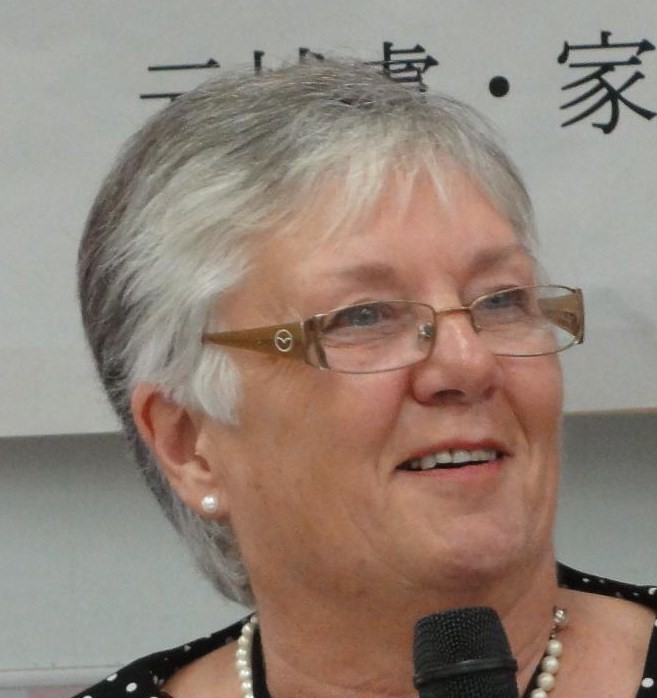 |
Thank you very much. My father was a POW in Changi, well that is where he ended up. I was born after the war. My father had been home some sixteen months before I was born so I don't have any memory of the war whatsoever.
I had a very happy childhood. I had a wonderful father, a wonderful mother. We weren't rich, but we were rich in love, and that's what I remember most of all, however, I can remember my mother saying that she endured during the first few years, only for a short term I think, when dad would have nightmares, and hold her in a headlock, but anyway she only mentioned it a couple of times.
Time went on and I remember my mother saying, "I'd like to go to Singapore." My father said and excuse the expression, "What the hell do we wanna go there for?" I spent three and half years in that hell hole. That came about 1991.
My father in 1991 organized with the Australian government to take a contingent, a very large contingent back to Singapore for the 50th anniversary of the fall of Singapore, at last Mum got her wish. Well, that started a love affair with my father and Singapore. My mother died in 2001 and six months later, "Come on, we are going to Singapore for the 60th anniversary of Singapore." And it was so my brother, my sister, my father, and myself and we had a wonderful time.
I was very fortunate my brother and I we forfeited our passports at Changi prison and left every article on us in a boardroom and were actually able to go right into Changi prison. I saw where my father had lived for three, three and half years. The cell, it was just cement with a cement block in the middle, raised yay high for them to sit in the cell on the hard cement and they ended up with callouses all over their shoulders. However, I came out of that prison, Dad and some other POWs were waiting at a place called Changi village, I walked up to him, I burst into tears, and just said thank you. I was very humbled by that experience. It is something that I will never ever forget.
In 2007, "Come on, we are going back to Singapore again, this time you are bringing your husband and your wife." And so we did all again and only probably 12 months ago, "I'd love to go back to Singapore again" and so he has been. Thank you very much and thank you for inviting us here.
Ms. Valerie Jean Hamley (Wife of Mr. Colin Hamley) |
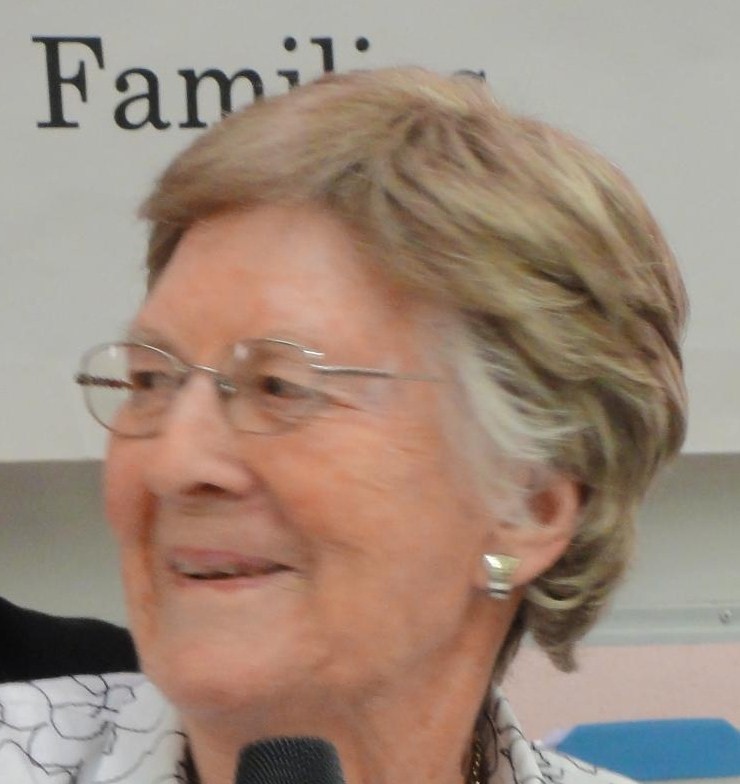 |
Thank you everybody. As we have heard the war was a very tragic, sad time. I actually lost two cousins, two in New Guinea, one was killed. I think he was leading troops through the jungle, shot by a Japanese sniper and the other one died of typhus. He was only 20 so that was very sad. I am very happy that Colin survived, even though his story is a sad one, he's not a sad person, by any means.
I am very happy that Colin survived because we have had wonderful more than sixty years together, we met when we worked together in the SEC, which is State Electricity Commission, and we were married on the eleventh of October in 1952, which makes next Thursday our 60th wedding anniversary and here we are.
Colin never spoke much about the war, I didn't speak a lot about it because he said nobody wanted to hear what happened to them, sort of try to forget it, and it is only in recent years that he has really spoken or opened up about it, however we as I said we have three sons, we have three lovely daughters-in-law, we have seven "great" grandchildren, lovely grandchildren.
Colin has actually kept himself very fit. When the boys were young he was a scout leader, and when they all used to go hiking, and then when he wasn't working he joined the athletic group, and they used to hike the mountains, and we still walk, we used to run, Colin has run six marathons and that's a pretty good achievement, and we still play bowls, lawn bowls, and the bowling club told us we could not go to Japan, because we would miss our lead guy (?) so anyway we have had a great life, and Colin's story is sad but he's not sad. He will never forget, and he will never forgive, but believe me he is, you know, a wonderful man. Thanks very much .
Mrs. June Patricia Martin (Sister of Mrs. Elsa Francis Hatfield) |
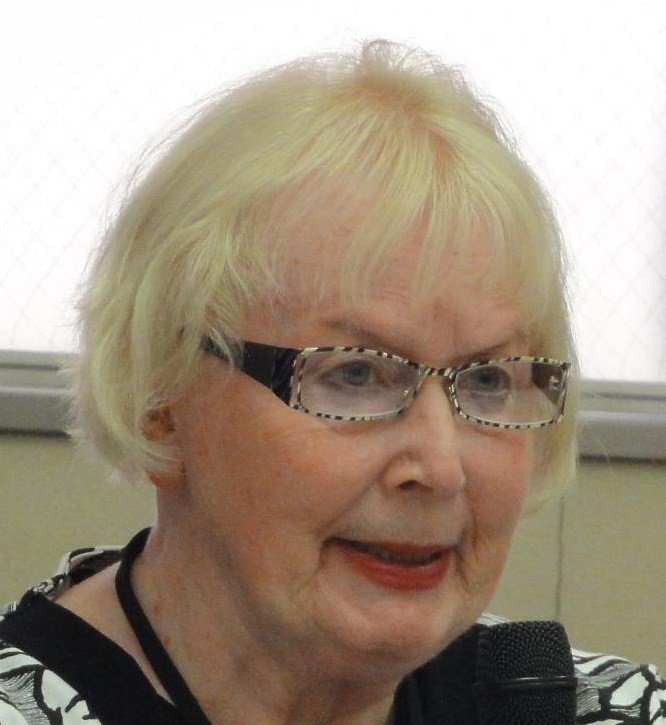 |
Good afternoon, I'm Elsa's sister and when Elsa was interned to Manila we never knew what happened to her, but a couple of months later, my mother, my brother and I were interned in Shanghai and we had pretty tight up, my mother certainly did because she was worried about my sister and my brother was always trying to escape and it made her very ill. As a child I thought I was a bit deprived. I did not have an education. For three and a half years, no schooling.
And most of my friends that I went to school with I never saw again. Most of the time in camp I was always terrified of the Japanese soldiers. They really looked fierce and had bayonets. You could hear them coming from the long distance away. Most of the guards were, we had a couple of them were really nice, but the worst people we had looking after for six months were the Korean police. They were terrible, but just for six months.
Towards the end of the war I remember a lot of leaflets being dropped and bombings continued until one day, Major General Chennault and his Flying Tigers came to rescue us.
One of the members of the Flying Tigers, the group leader Captain Peter Chen came in and no one believed what he said the war is over. You will be going away soon.
It took my mother a long time after the war to locate my sister and one day I just remember my sister coming in the car, coming up our driveway, and I was screaming to my mother, and everyone came running, and the ...came, that's when you arrived, yes that`s right, that was wonderful, but our brother died very young, died when he was sixty.
I'd like to thank you all, we had a wonderful time here and everyone has been very kind and very helpful.
Mrs. Belinda April Begley (Wife of Mr. Colin Neil Begley) |
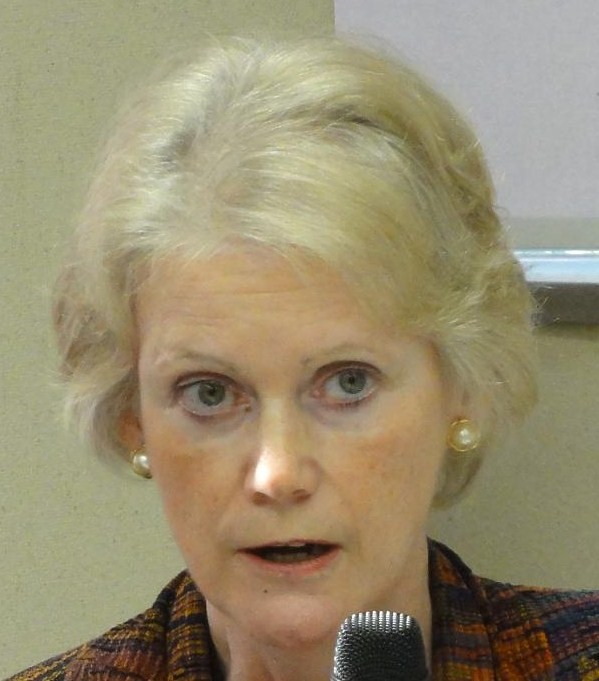 |
Well, as you might have gathered, my husband is a very optimistic person, I can say he's also very resilient, he doesn't allow any setbacks to stop him, and his philosophy of life is that you must seize every opportunity that you are given and follow it to the full. Whether his resilience of childhood had anything in making those tracks his, I don't know, but you know that it can only have been a positive thing.
Unfortunately his imprisonment did have a couple of adverse impacts on him. One of those was his physical health. As in his forwarded years(?), from the time of nine to thirteen, he suffered malnutrition and also very serious bouts of malaria. That has caused ongoing medical problems throughout his life, but he's never allowed any of them to cause a setback to him.
The other adverse impact was on his education and this is perhaps the one he regrets most. While he was a prisoner, in the camp and before that, his education was very fragmented, and so by the time the war was over when he was thirteen, he hadn't had any formal schooling for almost four years.
When he got back to Australia, the Australian education system just couldn't cope with him, they couldn't accommodate him, he was a child of thirteen, but they expected that his education level was probably about that of five year old, so they put him right back down into a class many years his junior. He hated it passionately and so as a result, he left school as soon as he possibly could at the age of sixteen.
But he always valued education and he encouraged his son to pursue it as far as he possibly could. He was extremely proud all his son's achievements. His son is now an eminent and internationally recognized research scientist researching the area of leukemia. There is a happy ending at the age of seventy, Neil had the chance to pursue a university education and he went to university in Australia and did an Arts degree. He achieved honors in every subject and in his year he was the top graduate in Queensland, the state of Queensland, and he was the seventh top graduate of the whole of Australia.
When Neil was selected to come on this friendship trip, he was asked what he would particularly like to do while he was here in Japan and he said he would like to go to Hiroshima and meet other Japanese people who were children, the same age as him or similar at the end of the war, so they could talk each other and show respect each other. The Japanese government had kindly arranged for us to do this and at around the time that was confirmed we learnt of the story of Sadako, the little Hiroshima girl who was two when the atomic bomb was dropped and then she subsequently developed leukemia. She had been told that if she made thousands paper cranes, her wish, which was to get better, would be granted. We also learnt that unfortunately she died before she could complete the 1000 cranes, but that her school friends continued on and made the 1000 cranes, and that their wish was the world peace. Neil wanted to tell this story to Australian school children so he has gone around to various schools in Brisbane and told them the story and taught them how to make paper cranes and the children of Brisbane have made more than 1000 cranes for us to take to Hiroshima, and place on the children's peace memorial there.
Neil and I are both very grateful to have a chance to come here to Japan and we can only commend the Japanese government on their initiative to promote friendship for ex-prisoners-of-war. Thank you.